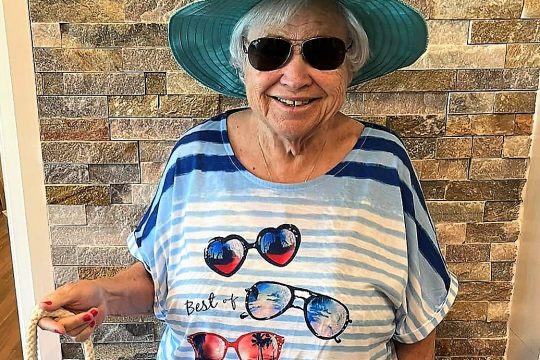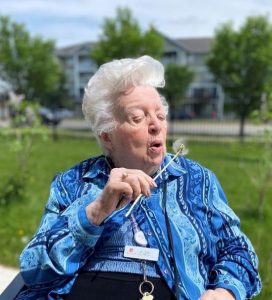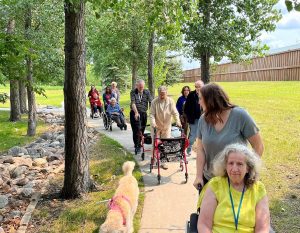
Summer is in full swing in Canada, and temperatures are soaring.
Today’s seniors are more active than ever before. Popular pastimes such as golf, walking, and gardening provide daily opportunities to exercise and socialize, and there’s no better time to enjoy these outdoor pursuits than the summer months.
But when summer arrives, so does the extreme heat. With record breaking temperatures and air quality alerts, you might wonder: how can I stay safe and comfortable? If you are an older adult or caregiver to an elderly person, here are some ways to safely enjoy the summer months throughout your retirement years.
Why Do Weather Events Affect Older Adults More?
 Rising temperatures and decreasing air quality affect adults aged 65 and older differently. This is due to a number of factors.
Rising temperatures and decreasing air quality affect adults aged 65 and older differently. This is due to a number of factors.
As we age, our ability to adapt to sudden changes in temperature wanes, making us more susceptible to heat-related health problems. Another factor that can put many elderly people at risk is reduced “thermal sensation” — or the feeling of being hot. In addition, older adults may have a chronic medical condition that changes the way their body responds to heat. Some common medications also affect the body’s ability to control its temperature or sweat.
Similarly, seniors — especially those with existing illnesses or chronic health conditions — are at higher risk when exposed to air pollution, like smoke from wildfires. Even at low concentrations, air pollution can be harmful to people’s health.
Meanwhile, mobility and memory problems can make it harder for seniors to recognize a problem or get the help they need when they start to feel uncomfortable.
What to do in the Event of Extreme Weather
Stay hydrated. Hydration is incredibly important for seniors. Drink lots of fluids on hot days. If you don’t like water, look for other options like fruit or vegetable juices. Know the warning signs of dehydration or heat related illness, and don’t hesitate to get in touch with medical experts to discuss how health conditions or medications may affect your fluid intake or ability to cool off.
Be mindful of the changing weather. Keep an eye on the forecast. And take note of humidity levels, because sweating is not as effective at cooling you down when the weather is very humid. Stay alert for changing weather conditions and look for heat or air quality warnings online or via your local news channel. Try to avoid going out and doing anything strenuous during the hottest periods of the day or stay home during weather advisories.
Dress for the weather. On hot, sunny days, the Heath Canada recommends wearing loose, lightweight, and light-colored clothing. It’s a good idea to wear layers that can be easily removed, as well as comfortable, non-slip shoes. Always wear a hat and apply sunscreen before going outside.
Look for creative ways to stay cool. On particularly hot days, little things can have a big impact. Reach for your favourite ice pops; use a damp cloth cool down; and find other clever “hacks” to beat the heat.
Keep your home safe and comfortable. A little strategic planning can help make your home safer, all summer long. Avoid cooking too much on hot days. Keep air vents unobstructed. Lower the blinds or close curtains during the hottest and sunniest parts of the day. Adjust your thermostat to a comfortable level.
Stay Informed to Reduce Exposure to Air Pollution
 This past summer has had a record number of forest fires, which have caused air quality to plummet in many parts of Canada. So take the time to look at Air Quality Health Index (AQHI) and Air Quality Alerts, which keep you informed of current local air quality and help you make the best decisions to protect yourself and those you care about.
This past summer has had a record number of forest fires, which have caused air quality to plummet in many parts of Canada. So take the time to look at Air Quality Health Index (AQHI) and Air Quality Alerts, which keep you informed of current local air quality and help you make the best decisions to protect yourself and those you care about.
Common, milder symptoms of air pollutants. Including wildfire smoke exposure include:
- Eye irritation
- Runny nose and sinus irritation
- Lung and throat irritation that can cause a mild cough
- Headaches
Mild irritation and discomfort are common, and usually disappear when the smoke clears. However, some people may experience more severe symptoms:
- Wheezing
- Shortness of breath
- Severe cough
- Dizziness
- Chest pain
- Heart palpitations
If you experience any of these more severe symptoms, talk to a healthcare professional.
How Living in A Retirement Residence Helps Older Adults during Extreme Weather
Living in a retirement residence can provide several benefits to seniors during heat waves or poor air quality situations. Here is how All Seniors Care helps keep seniors cool during summer.
Nutrition and Hydration:
 Senior residences provide chef prepared and dietician approved meals, ensuring older adults are getting proper nutrition during extreme weather conditions. Summer fare highlights food with water content, like fruit, salads, and smoothies. For those in assisted living or memory care, water intake can also be monitored to ensure seniors stay hydrated during heat waves.
Senior residences provide chef prepared and dietician approved meals, ensuring older adults are getting proper nutrition during extreme weather conditions. Summer fare highlights food with water content, like fruit, salads, and smoothies. For those in assisted living or memory care, water intake can also be monitored to ensure seniors stay hydrated during heat waves.
Activities and Exercise:
There is always something happening at All Seniors Care residences! When planning activities, our Health & Wellness professionals consider the weather conditions, every day. Since we all love to get outside in the summer, physical exercise and activities are scheduled during the coolest part of the day. In extreme heat or when air quality is poor, events like our recent Campfire Social are moved inside to ensure everyone’s safety and comfort.
Adapted Environment:
All Seniors Care senior residences are equipped with amenities to manage extreme temperatures, including air conditioning and heating systems. This can provide seniors with a comfortable living environment despite outdoor conditions. Also, all our communities have advanced air filtration as part of their larger HVAC systems that can help filter out harmful particles. For individual comfort, each suite has a temperature control system so that residents can adjust the indoor climate, ensuring comfortable living conditions all year round.
On-Site Health Monitoring:
On-site health professionals monitor residents’ wellbeing. During a heatwave or wildfire, these professionals can help identify symptoms of heat-related illnesses or respiratory problems early, ensuring timely intervention.
Companionship:
Extreme weather events can be stressful and isolating, particularly for seniors living alone. In a retirement home, there is the added benefit of companionship and shared experiences. Staff and fellow residents can provide emotional support and help ease anxiety during such events.
Assistance with Daily Activities:
During adverse weather conditions, performing daily tasks can be more difficult. ASC staff can assist with these tasks, reducing the risk of falls and alleviating the burden of daily chores.
Green Spaces:
Given the potential risks of outdoor air pollution during hot weather days, the best retirement residences have patios surrounded by tress and gardens, as well as plenty of shaded areas. Inside the residence, plants create a calming environment and help purify the air.
In essence, senior care homes offer an environment that’s designed to cater to the needs of older adults, helping them be well-equipped to handle extreme weather conditions like heat waves and poor air quality.
First-Class Senior Living Communities
 As the mercury rises, one question often bubbles up – how can our senior loved ones stay safe and comfortable?
As the mercury rises, one question often bubbles up – how can our senior loved ones stay safe and comfortable?
ASC retirement communities also have a variety of excellent on-site facilities to enjoy all summer long, including pools, gyms, hair salons, dining and seating areas, and movie theatres. Designated health and wellness teams organise and host a wide range of exciting activities to get involved in, from walking groups and exercise classes to arts and crafts and celebrating annual events with friends and neighbours.
Here at All Seniors Care, we have residences around the country, from Calgary to Quebec. If you’re looking to move and considering a retirement living centre, we can help you find the perfect home. Contact us to learn more.
Writer – Julianna McLeod
Julianna is a health and wellness expert at All Seniors Care. Her mission is to create content that empowers seniors to form sustainable solutions for lasting health and happiness. She is an experienced writer, editor, and Recreational Therapist living in Toronto.